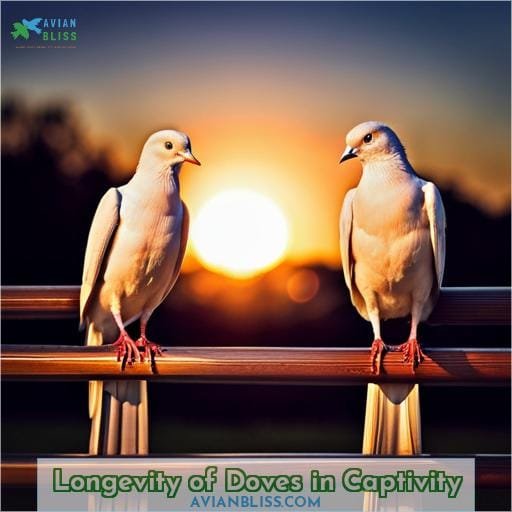
Doves, like many pets, need proper care to thrive. In captivity, they’re often sheltered from the dangers they face in the wild, which can significantly affect their lifespan. For instance, the most common pet dove, the *Zenaida macroura*, better known as the mourning dove, can live up to a decade under good care. That’s a good chunk of time to enjoy their calming presence! However, other species of doves can live even longer, sometimes reaching 15 years or more. But what contributes to these numbers? Let’s explore that together.
Understanding Dove Lifespan in Captivity
When we’re discussing how long doves live, we need to look at several influencing factors. In captivity, doves generally enjoy a longer life compared to their wild counterparts, who face threats like predators and diseases. Captive doves usually live anywhere from 10 to 15 years, depending on their species and the conditions provided.
One of the biggest advantages for doves living in captivity is that they have a carefully managed environment. They aren’t exposed to the harsh realities of nature. This structured setting can lead to fewer injuries and illnesses, meaning they can focus on living their best lives. But let’s not overlook that their care plays a huge role.
A healthy diet, proper housing, and social interaction can all contribute to a longer lifespan. Doves that are well-fed, have enough space to move around, and are kept stimulated with toys and companions tend to live much longer. It’s like how humans thrive on a balanced diet and positive relationships.
The Different Species of Doves
Not all doves are created equal when it comes to lifespan! There are various species, each with its unique characteristics and life expectancy. Here are a few common ones you might come across:
- Mourning Dove: As the most common pet dove, they typically live between 5 and 10 years in captivity.
- Ringneck Dove: These friendly birds often live up to 15 years, and they can be quite sociable!
- Rock Dove: The ancestors of many pet pigeons, they can also live up to 15 years when properly cared for.
Each of these doves has its own set of needs, which can affect how long they live. For example, the mourning dove might need more specific dietary requirements compared to a ringneck dove, which can eat a wider range of seeds and fruits.
So when choosing a dove as a pet, it’s important to research their specific needs to ensure they thrive for many years.
Factors Affecting Lifespan in Captivity
The lifespan of a dove can be impacted by several factors. Let’s break these down further so you can better understand what helps them live longer lives.
1. Diet: Nutrition plays a crucial role in the health of any pet. Doves need a balanced diet rich in seeds, grains, and sometimes fresh fruits and vegetables. Poor nutrition can lead to health issues that can shorten their lives.
2. Housing: Providing a safe, clean, and spacious living environment can greatly influence a dove’s lifespan. They need enough room to fly around and exercise. A cramped cage can lead to physical problems and shorten their lives.
3. Veterinary Care: Regular check-ups with an avian vet can catch potential health problems early on. Much like humans, doves can suffer from diseases that are better managed with timely medical attention.
4. Social Interaction: Doves are social birds. Keeping them alone can lead to stress and loneliness. These emotional factors can affect their overall health and, consequently, their lifespan. If you can, consider getting them a companion!
Common Health Issues in Doves
Just like any pet, doves are prone to some health issues that can impact their longevity. Here are a few common concerns to be aware of:
– Obesity: This can occur if their diet is too high in fat or if they don’t get enough exercise. Overweight doves are more prone to other health issues, including heart problems.
– Respiratory Issues: Doves are sensitive to airborne toxins, such as cigarette smoke or mold. Ensure their living area is clean and well-ventilated to avoid respiratory troubles.
– Infections: Like many birds, doves can be susceptible to bacterial and viral infections. Regular vet visits can help prevent and treat these effectively.
Keeping an eye on these health issues can help you maintain a happy, healthy dove and extend its life.
Creating a Healthy Environment for Your Dove
If you’re planning to bring a dove into your home or have one already, creating a nurturing environment is key. Here are some tips to help your feathered friend live its best life:
– Space Matters: Doves need plenty of room to fly and explore. A spacious cage with horizontal bars allows for climbing and exercising.
– Grooming and Cleaning: Regularly clean the cage and provide fresh water and food daily. Doves love to bathe, so offering a shallow dish for bathing can also help keep their feathers in top condition.
– Mental Stimulation: Toys, perches, and safe items to explore can keep doves engaged and happy. Rotate their toys to keep things interesting.
– Companionship: If possible, consider getting more than one dove. They thrive on social interaction and will often be happier and healthier with a buddy.
By putting in the effort to provide a healthy environment, you’re setting your dove up for a long, happy life by your side.
In conclusion, doves can live quite long and fulfilling lives, especially in captivity. With proper care, attention to their health, and a stimulating environment, you might find that your dove could be with you for a decade or more. Remember, the commitment you make to your dove’s diet, housing, and companionship can make all the difference. So, if you’re ready to welcome one into your home, you have the chance to create a loving space for your little friend to thrive. Enjoy the coos and flutters, and know that you’re part of helping them live a long, happy life!

